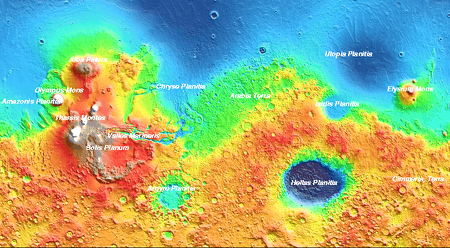Topsight, March 9, 2009

• Geoengineering Hits the Big-Time: My guess is that 2009 will be seen as the year geoengineering hit the mainstream. Just in the last couple of weeks, we've had:
- A deep look at geoengineering in New Scientist, complete with an editorial calling for its consideration;
- A lengthy article in Foreign Affairs arguing that geoengineering is all but certain to have enormous political implications (hmmm, where have we heard that before?).
- The University of East Anglia, home of the Tyndall Research Center (easily the leading organization for climate change study), is apparently set to launch a Geoengineering Assessment and Research program.
Interestingly, as of the last time I looked, my book Hacking the Earth remains the only general-audience book on geoengineering available. I don't expect that to last long, though.
What would it mean for geoengineering to go mainstream? Bad discussions on cable news, blogospheric screaming fits, mistaken conclusions that geoengineering would mean not having to cut carbon emissions (mistakes made by both geoengineering supporters and detractors)... and that's just the first week.
• Get Your RED MARS: In old-school terraforming news, Kim Stanley Robinson's genius Red Mars is now available as a free download. Direct link to PDF here, and it's also free on the Kindle.
Warning: it's the first of a trilogy, and you're likely to want to pick up and read the next two in the series, Green Mars and Blue Mars (the latter containing one of the best pieces of science fiction around the gritty details of governance I've yet seen).
• Galactic Sustainability: Jacob D. Haqq-Misra and Seth D. Baum write in the latest issue of the Journal of the British Interplanetary Society that the answer to the Fermi Paradox -- if the universe is teeming with life, how come they haven't already said hi? -- may be found in sustainability:
In this paper, we argue that this conclusion is premature by introducing the “Sustainability Solution” to the Fermi Paradox, which questions the Paradox’s assumption of faster (e.g. exponential) civilization growth. Drawing on insights from the sustainability of human civilization on Earth, we propose that faster-growth may not be sustainable on the galactic scale. If this is the case, then there may exist ETI that have not expanded throughout the galaxy or have done so but collapsed. These possibilities have implications for both searches for ETI and for human civilization management.
Haqq-Misra provides a bit more detail in a post at the Lifeboat Foundation blog, noting that issues of carrying capacity are fundamental to ecological analysis. I like this line of argument, as it parallels the point I tried to make with my own argument about the Fermi Paradox (in short, that a rapidly-expanding civilization limited by the speed of life would likely result in isolation and divergent social/biological evolution).
Funny how a bit of knowledge about ecoscience and political science can change your perspective on the future.
• Instant Immunity - Just Flip the Switch: I had to check twice to make sure this wasn't an April 1 gag, but it's apparently solid science: Scripps University researchers have developed a "covalent" immunization method that allows for near-instantaneous immunity.
The scientists injected these mice with chemicals specifically designed to trigger a programmable and "universal" immune reaction. They developed other chemicals, "adapter" molecules," that recognized the specific cancer cells. Once injected into the animal, the adapter molecules self-assembled with the antibodies to create covalent antibody-adapter complexes."The antibodies in our vaccine are designed to circulate inertly until they receive instructions from tailor-made small molecules to become active against a specific target," Barbas says. "The advantage of this method is that it opens up the possibility of having antibodies primed and ready to go in the time it takes to receive an injection or swallow a pill. This would apply whether the target is a cancer cell, flu virus, or a toxin like anthrax that soldiers or even civilian populations might have to face during a bioterrorism attack."
You have to know what you're going to be targeting, of course, so this won't help defend against unknown pathogens. Still, this kind of immune system boosting could be an extraordinarily useful augmentation in an era of increasingly aggressive zoonotic diseases.
• Go Read This: Charlie Stross' 21st Century FAQ is great fun and a smart idea, but there's one question & answer that stands out as mandatory reading:
Q: Politics? Which of (Socialism | Capitalism | Libertarianism | Fascism | Democracy) is going to save us?A: Probably none of the above.
...and he goes on to describe why we have yet to see the form of political organization that will shape the century (I won't spoil it by reprinting it here). I'm working on a similar idea, and all I could say is "hell, yes!"
• Futuresonic Presentation: So my appearance at Futuresonic in Manchester, UK, has been confirmed, and -- much to my pleasant surprise -- they've given me the kickoff slot, at the opening night event on Wednesday May 13. Best of all, the opening night event is FREE. If you're in the area, please come on by.






Comments
Ooh, I live in Manchester UK, so there is a good chance I will see you at FutureSonic
Posted by: John B Stone | March 10, 2009 6:01 PM